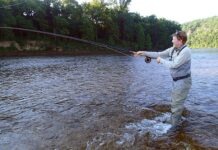Written By: Capt. Joe Evans, Joe Evans Fishing
All photos by Joe Evans Fishing
The Chesapeake Bay and its tributaries are the primary spawning and nursery waters for about 80% of all the Atlantic striped bass stock. Spawning occurs in April and May, and the young fish remain here two to five years before migrating out to the Atlantic. During the late spring and summer, our resident fish–which generally range from 12 to 24 inches–make up the heart of the year’s pursuit. These one- to six-pound fish are always a thrill, especially for fly-rodders. Here are three tips to keep in mind during your next trip:

1. Bring Two Rods
We like to rig up a pair of 7- to 9-weight rods: one with a floating line and a 9-foot, 0x tapered leader, and a second rod with a 300-450 grain Depth Charge 3D sinking line and a 6-foot section of level 12-pound fluorocarbon leader. The first rod we use for throwing poppers into the shallows, and for occasions when the fish are schooled up and breaking the surface, chasing bay anchovies and silversides. And the second rod (with the sinking line) we use for dredging flies over fish suspended in deeper waters. Clousers, Deceivers, and Game Changers–all in sizes 2 to 2/0–work just fine for either one.

2. Find Moving Water
Moving water is essential to your success, because stripers just stop eating in slack water. A falling tide flushes small bait out of the creeks and sloughs, creating ideal ambush opportunities for stripers and even spotted sea trout, so that’s where you want to cast. Otherwise, look for rocky or marshy points and corners where the current rips and predator fish can wait in the eddies for something tasty to sweep by.
3. Follow the Birds
Large gulls are the best fishfinders, so do your best to follow them to where the action is. Likewise, if you haven’t seen any birds in a while, it may be time to move to a new spot.
Capt. Joe Evans is owner and operator of Joe Evans Fishing in Annapolis, MD.
Credit: Source link






























